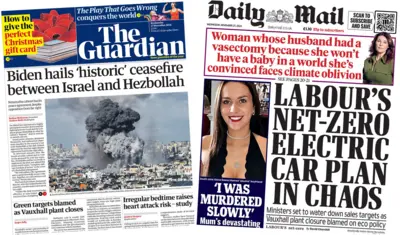We've updated our Privacy and Cookies Policy
We've made some important changes to our Privacy and Cookies Policy and we want you to know what this means for you and your data.
Pamela Anderson's 'love' for Julian Assange
Image source, PA
Top Stories
Pamela Anderson has talked of her "love" for Julian Assange, calling him "the most famous refugee of our time".
The former Baywatch star wrote about the Wikileaks founder .
She said that her relationship with Mr Assange, 45, was "no secret" and that he was "one of my favourite people".
The post comes five months after Ms Anderson, 49, was seen delivering lunch to him at the Ecuadorean Embassy in London, where Mr Assange has lived for almost five years.
He claimed asylum there in 2012, in order to avoid extradition to Sweden.
Top Stories
Mr Assange is wanted for questioning in Sweden over a sex allegation, which he denies.
The actress said that he is being "persecuted" by the US for "exposing them" through his work and worries about whether Sweden would then extradite him across the Atlantic.
Alongside a picture of Mr Assange on her blog, she wrote: "He might be the most famous, most politicised refugee of our time.
"Famous for being persecuted is not a position of power but a position of vulnerability. I am concerned.
Top Stories
Image source, PA
"Julian is a human being who is extremely empathetic and cares deeply about the world.
"And because of his work he has made some powerful enemies in a few countries, America especially, by exposing them."
Ms Anderson says she has "faith" that Sweden "will not cave to the US," saying: "This is a good opportunity to show Sweden's strength."
She added: "Julian is trying to free the world by educating it. It is a romantic struggle. I love him for this."
Walk free?
The actress previously referred to him as her "dear friend" and said she would not be surprised if people reduced their connection to "just a sexual relationship".
In February 2016, a UN panel ruled that Mr Assange should be allowed to go free as he had been "arbitrarily detained" and should get compensation.
But the then-Foreign Secretary Philip Hammond called the decision "ridiculous".
Top Stories
More to explore
Most read
Content is not available








